Georgia’s ruling party is building a Russian-style dictatorship — and it’s working
Georgian Dream terminated the parliamentary mandates of 49 opposition lawmakers on Monday, as months of pro-EU protests face an intensifying crackdown through new restrictive legislation and police action.
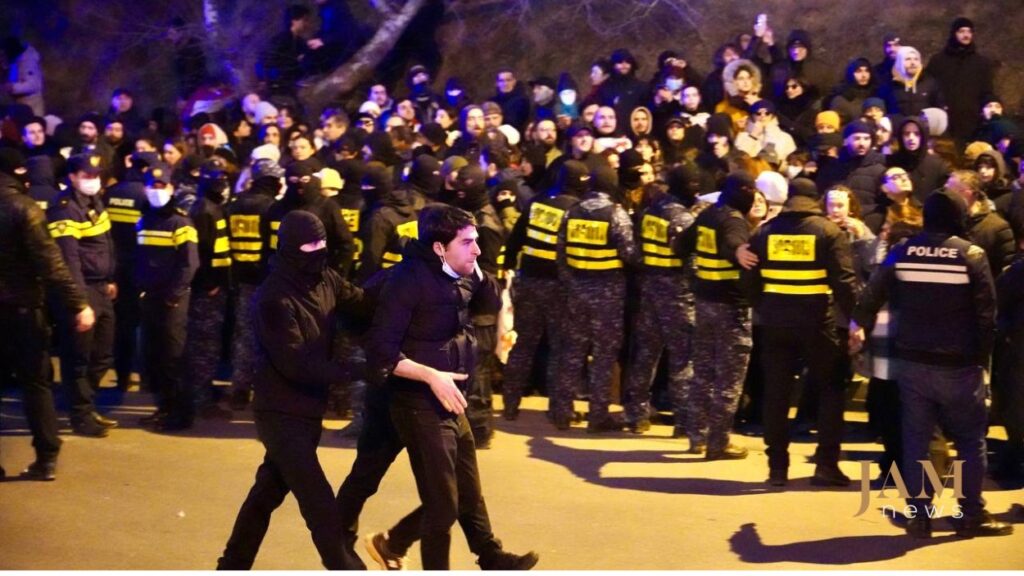

Nearly three months into a determined protest movement demanding snap elections, Georgia’s ruling party is resorting to increasingly heavy-handed tactics to quash resistance — and its latest moves have the country on edge as observers warn of a dangerous authoritarian turn.
The outcome will determine Georgia’s political trajectory for years to come amid the country’s third month of protests against the pro-Russian government’s U-turn on EU integration.
The latest dramatic step came on 5 February, when the Georgian Dream (GD) party terminated the mandates of 49 opposition MPs from the Coalition for Change, Unity-UNM, and Strong Georgia alliances who had denounced October’s parliamentary elections as rigged. GD secretary Mamuka Mdinaradze justified the purge as necessary to curb “political sabotage” by opposition figures who “always follow external instructions.”
The 49 lawmakers had themselves submitted formal termination requests to the GD-controlled parliament to protest the legitimacy of the disputed 26 October 2024 elections. However, as the protests have dragged on and the government’s crackdown has intensified, the loss of parliamentary immunity has left these opposition figures vulnerable to targeted persecution.
“Ivanishvili has orders from the Kremlin to neutralize all politicians who play a significant role in civil resistance and protests,” warned Irakli Kupradze of Strong Georgia. The most prominent potential target is Tbilisi mayor Nika Melia, a protest leader who could face charges over June 2024 demonstrations.
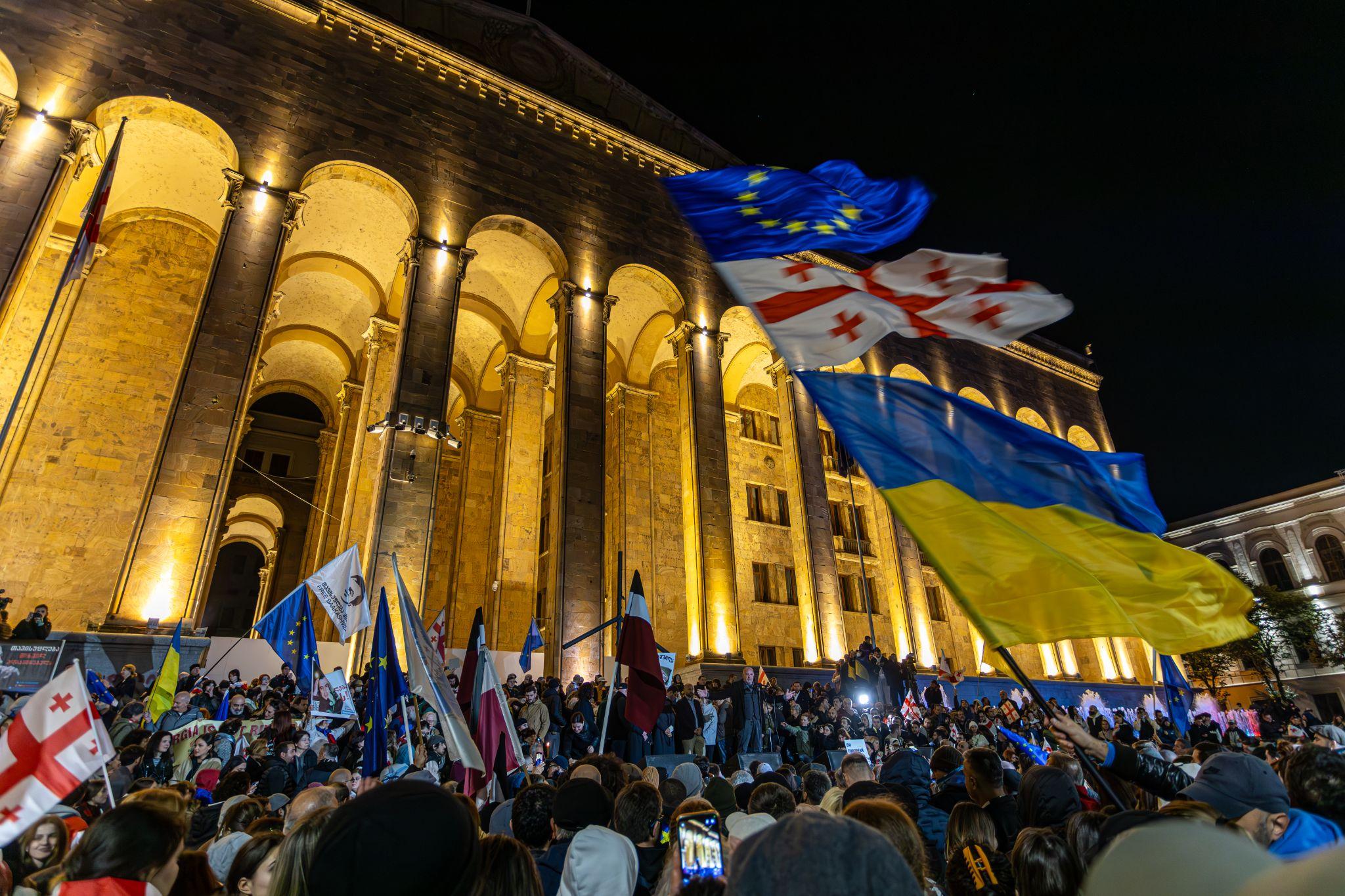
Georgia erupts as president slams Russia’s grip on disputed vote
A mounting campaign of repressive laws
The current crisis has deep roots in Georgian Dream’s authoritarian trajectory. After failing to implement a Russian-style foreign agents law in 2023 due to mass protests, the party successfully passed a modified version in May 2024 despite widespread opposition.
This law, which required organizations receiving over 20% foreign funding to register as “foreign agents,” was expanded to include individuals and became a template for similar legislation in countries like Serbia and Kyrgyzstan.
The law’s implementation, coupled with Georgian Dream’s decision in November 2024 to suspend EU accession talks until 2028, sparked the current wave of protests – the largest in Georgia’s post-Soviet history. These demonstrations have endured for over three months despite increasingly brutal police tactics and systematic harassment of activists.
Now, as the protests show no signs of abating, Georgian Dream is further tightening its grip through new restrictive measures that will further tighten the “foreign agents law” and go further.
On 5 February, Mdinaradze announced initiatives to restrict foreign funding for media, remove NGOs from public decision-making, and prohibit civil servants from receiving overseas grants.
The Georgian Dream is framing the proposed legislative measures as aligning with Western legal standards, but in reality, they closely follow Russia’s blueprint for dismantling civil society, silencing independent media, and consolidating power:
- A new law on NGOs and civil society organizations—which GD secretary Mamuka Mdinaradze falsely claims is an “exact copy” of the US Foreign Agents Registration Act (FARA)—is modeled more closely on Russia’s 2012 “foreign agents” law, which has been used to dismantle independent organizations and suppress dissent systematically. Unlike FARA, which primarily applies to lobbying on behalf of foreign governments, Georgia’s version would classify NGOs receiving any foreign funding as foreign agents, forcing them into restrictive registration and reporting requirements—paving the way for legal harassment, smears, and shutdowns. This escalates last year’s Russian-style “foreign agents” law, which was enacted despite mass protests.
- Amendments to existing laws would strip NGOs of their previously guaranteed role in public decision-making, further isolating civil society from governance. This follows Russia’s path of gradually purging independent voices from policy discussions, ensuring that only state-approved organizations remain.
- A new media law, which the government misleadingly claims follows the British model, mirrors Moscow’s strategy of controlling the press under the guise of enforcing “objectivity.” It would establish a state-controlled regulatory framework to police journalism, weaponizing the concept of media standards to justify censorship. The law explicitly targets independent outlets by restricting foreign funding, a move that would paralyze Georgia’s already fragile free press—just as Russia did before fully crushing independent journalism.
- New restrictions on public sector employees would ban civil servants from receiving any foreign-funded benefits—such as training, salary supplements, or travel grants—without government approval. Framed as an anti-corruption measure, this policy instead mirrors Russia’s long-standing efforts to isolate public servants from foreign influence, restricting access to international professional development and silencing dissent within institutions.
The initiatives follow amendments proposed on 3 February that significantly increased fines and prison terms for offenses like petty hooliganism, disobeying police, and insulting officials while giving the police increased powers to disperse demonstrations. This step could issue a death sentence to the protests, which are heavily marked by police brutality.
Public Defender Levan Ioseliani urged parliament not to fast-track the “disproportionate” changes, warning they “pose a serious threat” to fundamental rights.
TI-Georgia did not mince words as it condemned the proposed legislation as “dictatorial regulations” designed to suppress pro-EU protests and instill fear, warning that they align with authoritarian tactics by criminalizing dissent, expanding police powers, and imposing severe restrictions on free expression, assembly, and public criticism of government officials.
President Salome Zourabichvili, who refuses to step down despite the Georgian Dream electing her loyalist successor Mikheil Kavelashvili and claims she is the last legitimate power left in Georgia, slammed the proposed changes on X.
“Ivanishvili’s illegitimate parliament is pushing through new laws and amendments designed to silence dissent and suppress the voice of protest,” she said, berating the Russian-made oligarch behind the Georgian Dream.
These legislative measures have sparked strong international condemnation, with European Commissioner for Enlargement Martha Kos warning that the amendments pose a serious threat to fundamental freedoms, particularly freedom of expression and the right to peaceful assembly.
She called the developments deeply alarming and urged the Georgian government to reverse course, stating:
“The will of the Georgian people must be respected. Georgia must reaffirm its commitment to its EU path rather than suppressing democratic rights.”
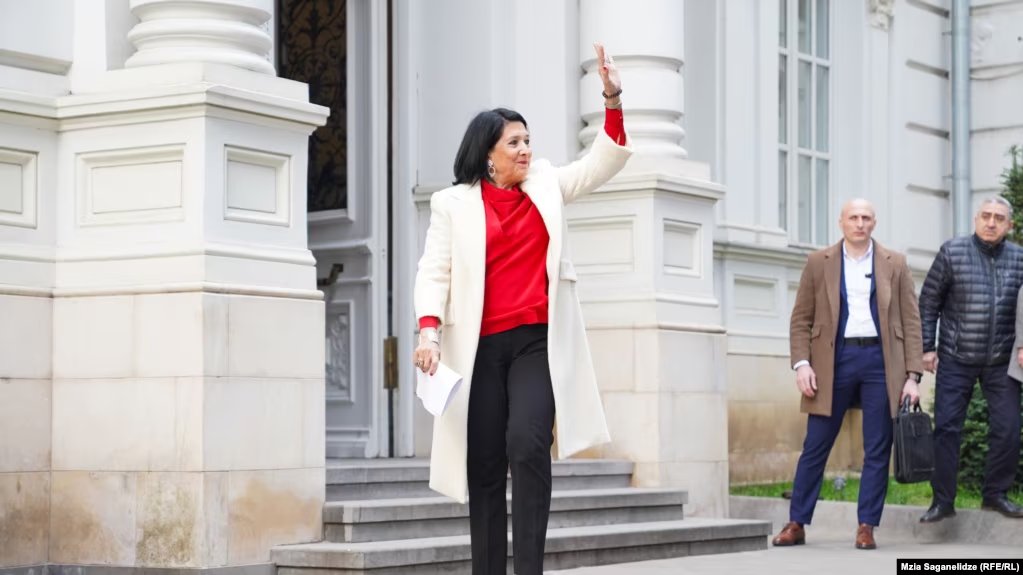
“I take the legitimacy with me.” Georgia’s President exits palace as new pro-Russian leader takes power
The proposed oppressive legislation continues a trend that has been set in motion since last spring.
Controversial amendments to the Law on Broadcasting, the Law on Electronic Communications, and the Criminal Code, adopted in a expedited manner by the GD-controlled parliament in late December 2024 and rubber-stamped by Kavelashvili immediately after being sworn in, were widely criticized by NGOs and rights groups as threatening freedom of expression and privacy rights.
The latest moves follow a pattern that began with Georgian Dream’s first attempt to pass the “foreign agents” law in March 2023, which was withdrawn after massive protests. The Russian-style legislation, reintroduced in April 2024, requires organizations receiving over 20% foreign funding to register as “foreign agents” – a Soviet-era term implying espionage. Unlike the US Foreign Agents Registration Act which targets foreign government lobbying, Georgia’s law affects virtually all NGOs and civil society groups, from major watchdogs to small charities.
Here at Euromaidan Press, we are committed to showing that Russia’s war against Ukraine is part of a larger story: the war against democracy.
Help our mission — become our patron right now.
The timing appears coordinated with similar laws in other Russia-aligned states like Kyrgyzstan and Serbia, suggesting a concerted push to expand Moscow’s influence. Before the third parliamentary vote, the law was secretly amended to extend to individuals, who could face heavy fines for failing to disclose personal information, including intimate details, when requested by authorities.
Georgian Dream’s founder Bidzina Ivanishvili, who made his fortune in Russia, has since doubled down on anti-Western rhetoric, warning in a 29 April speech that Georgia is “neither Yanukovych’s Ukraine nor Shevardnadze’s Georgia” — implying protests won’t succeed in ousting his party. He accused NGOs of being tools for foreign powers seeking a “bloody coup.”
Ever since, it has led to chilling effects on the civic sector, with NGOs facing closure or being forced to use legal acrobatics like re-registration in Estonia to evade restrictions.
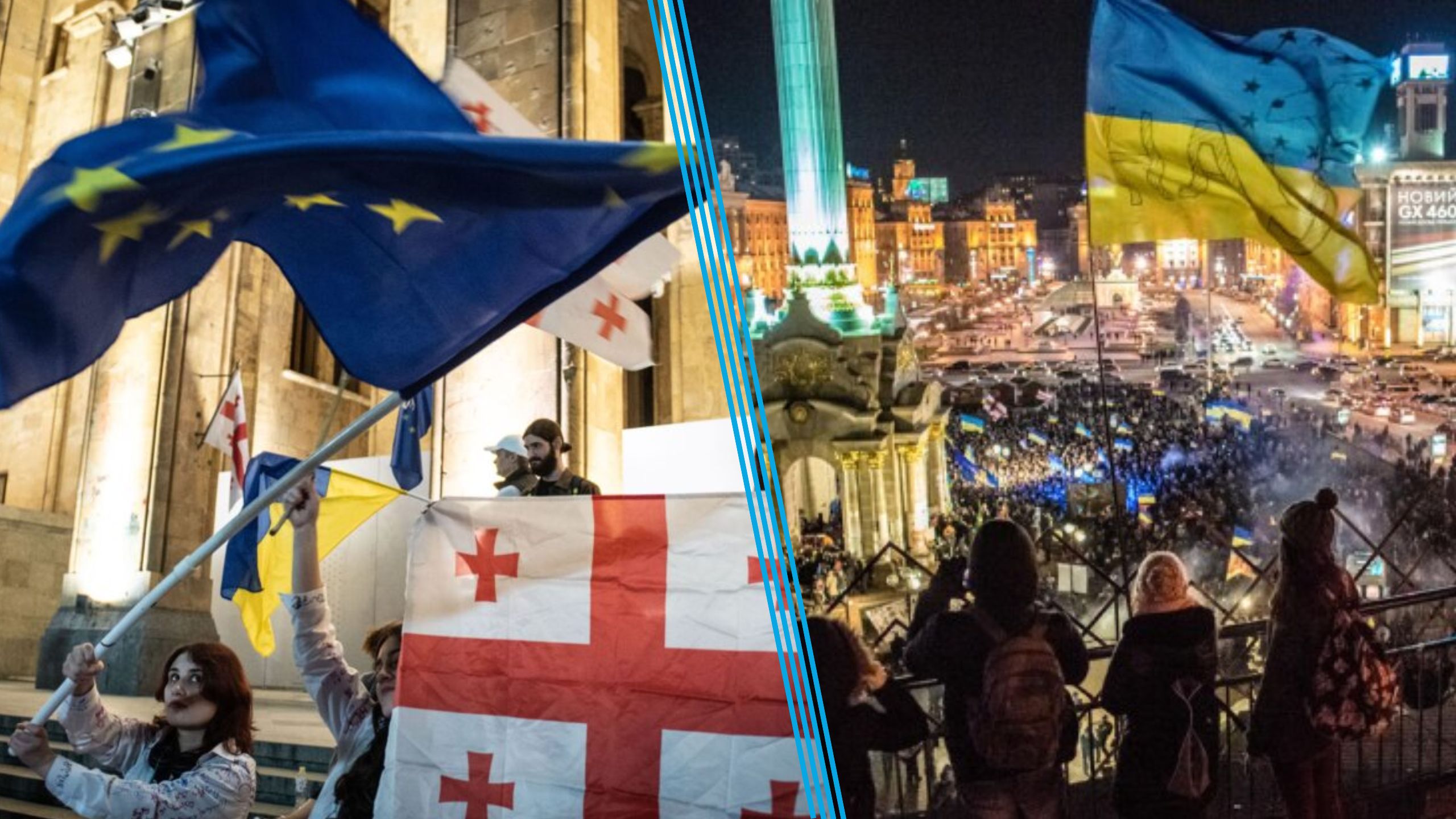
“Story of a dying empire”: Georgia’s “foreign agent” law protests echo Ukraine’s Euromaidan
Georgian Dream wants to “boil the frog”
Critics fear the raft of laws is part of a “boiling the frog” strategy to gradually stifle the protest movement that erupted in November after GD suspended Georgia’s EU accession process until 2028. As demonstrations stretched on, authorities resorted to tactics like criminalizing highway blockages, searching activists’ homes, and prosecuting participants, documented in civil.ge‘s Chronicle of Repression.
The arrest of journalist Mzia Amaghlobeli in January for slapping a police officer after facing repeated insults sparked particular outrage. At publication time, she was on day 26 of her hunger strike.
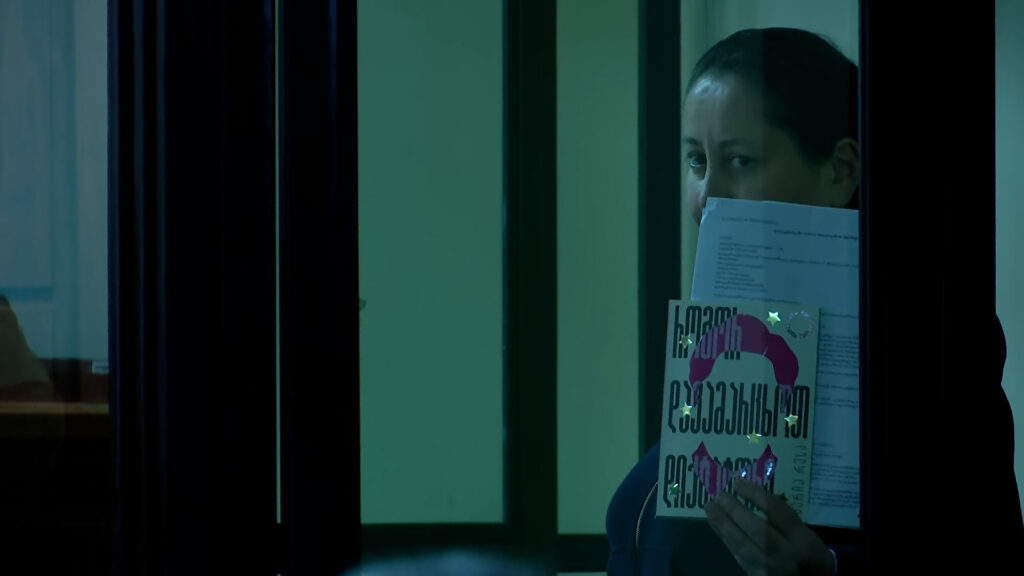
On 1 February, police searched the homes of three activists from the “Daitove” and “Jiutebi” groups, detaining all three.
The next day, the government broke up a protest under the pretext of it obstructing a road that they preemptively classified as being nationally important.
“The government is clearly using these last-minute changes to intimidate citizens and dissuade them from exercising their constitutional right to assembly,” said Tamta Mikeladze of the Social Justice Center.
This “slow boil” approach reflects a recognition that drastic steps to crush protests could backfire and incite greater resistance. By gradually ratcheting up pressure, the government aims to demoralize demonstrators and exhaust the movement while avoiding a massive public backlash.
On 5 February, President Salome Zourabichvili declared that “political life in Georgia has ended” and urged international pressure on GD to call new elections. She accused the government of transforming into a “Russian-style dictatorship” and slammed the mandate terminations for eliminating “any political space” in the country.
“Foreign policy no longer exists,” Zourabichvili said, dismissing GD officials’ trips abroad as empty gestures. “The economy has come to a standstill, investment has been halted.”
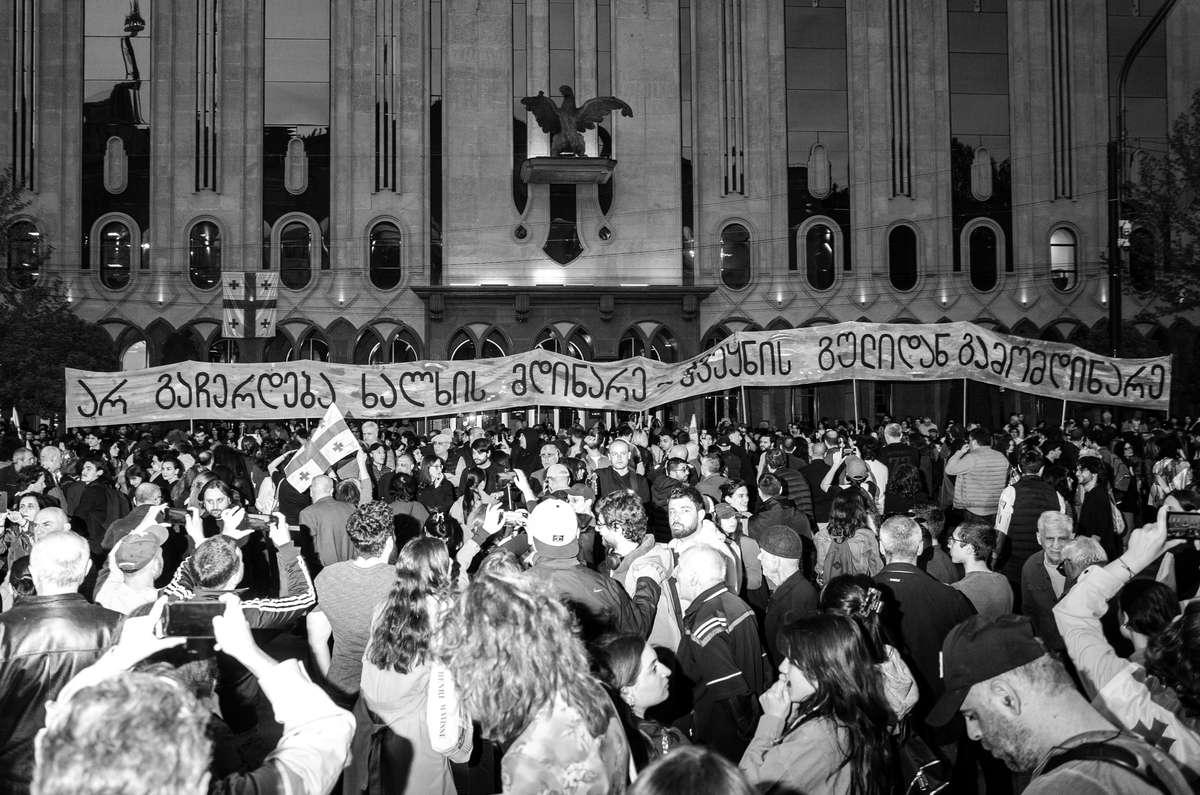
From Rose Revolution to “Russian Dream”: Georgia at breaking point with pivotal pro-EU protests
The president called on Western allies to take a firmer stance against the crackdown and demand elections jointly with the Georgian opposition. She also criticized the politicization of the public broadcaster and defense ministry.
“I want to address our armed forces and tell them that I will always stand by their side, so they have every opportunity and right to protect this country as an independent, sovereign Georgia,” Zourabichvili said.
With no compromise in sight, Georgia’s political crisis increasingly resembles a war of attrition — a test of whether protest momentum can outlast GD’s determination to retain power at any cost. But as international alarm grows and the country’s stability and democratic development hang in the balance, some see an authoritarian endgame as the most likely scenario.
“If we allow this precedent again, they will remain in a sabotage mode indefinitely—until they win, and ‘Natsi’ (a derogatory term for the United National Movement) will never win in Georgia,” Georgian Dream’s Mdinaradze said of the opposition. For those in the streets defying water cannons, arrest, and demonization, that grim prophecy is precisely what they aim to disprove.




